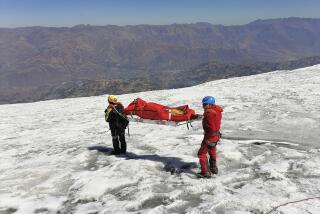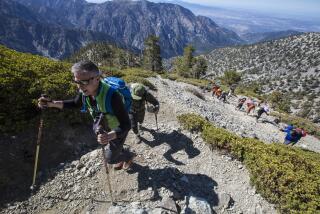A gathering in the forest to remember sociologist’s son
- Share via
Eighteen months, two brutal winters and countless bouts of panic after her son vanished, Linda Pulliam stood in an Alpine County forest clearing on a recent evening and said goodbye.
Inside a circle of stones pulled from the same creek where traces of Kurt LeBlanc’s remains were at last discovered, mourners gathered to pay their respects.
A local sculptor had crafted an ode to LeBlanc in metal -- a star for the astronomy that intrigued him, musical notes and a guitar for his primary passion, and words he had shared with Pulliam three years before his death: “I go to the mountains to feel the breath of Nature moving through me.”
It was 7:30 p.m. July 27 -- the moment when he would have turned 36. A friend played a song LeBlanc composed, called “Things Change.” Standing in the circle was the Alpine County sheriff’s deputy assigned to the case. A few dozen community members and friends of Kurt’s dad, Richard LeBlanc, came too. A local vintner donated a case of wine for the memorial gathering that went on late into the night in a nearby campground.
“It was a very healing event for me,” said Pulliam, 57, a Humboldt State University sociologist who, in straining to wring meaning from loss, began to study the experiences of families like hers -- loved ones of missing adults.
Pulliam’s search for her missing son, and the research it led her to, were the subject of a Column One that appeared in The Times in April.
Reserved and in many ways unremarkable to strangers, LeBlanc clocked out on the sixth day of his job as a Bear Valley ski lift operator on Dec. 21, 2005. Then, he vanished.
In doing so, he joined the ranks of 50,000 missing adults nationwide. As a single male who could not lay claim to an untarnished history, LeBlanc would not receive the outpouring of concern bestowed on children or the more obviously vulnerable.
Even LeBlanc’s dad took 10 days to file a missing person’s report, believing his son must have gone off with friends to party.
By the time Pulliam arrived in Bear Valley to agitate for action, a thick blanket of snow covered the valley floor. Conditions weren’t clear enough for helicopters. Cadaver dogs ventured into the woods near the condo where LeBlanc had been living and returned with nothing.
As a detective at Alpine County’s tiny, overstrained sheriff’s office followed dead-end leads and the seasons shifted, Pulliam and Richard LeBlanc hiked miles of wilderness in search of clues: a hair too short to be tested by the state forensics lab, bone shards that proved to belong to coyote or deer.
Then, in mid-June, a couple of mountain bikers took off down a little-used snowmobile trail that cuts roughly between the ski resort and the condos. Pulliam and Richard LeBlanc had each searched it, but the bikers ventured deeper.
There, in a clearing, was a Las Vegas mug that Kurt LeBlanc often carried. In the stream was a sweat shirt and T-shirt. In a tree was a piece of a black ski jacket -- LeBlanc’s work ID still attached. Bone fragments peppered the ground.
Guided by the bikers on a subsequent trip, days later, Pulliam and Richard LeBlanc gathered 27 fragments. Only two proved to be human -- a shard of skull and part of an arm. Wild animals, Pulliam would learn, had dragged plenty of prey through this clearing.
DNA tests have not yet confirmed that the remains are LeBlanc’s. But the work ID, the mug and the T-shirt -- given to him by his grandmother -- leave little doubt for Pulliam.
The circumstances of LeBlanc’s death remain unclear. Was he attacked by a mountain lion? Did he attempt a shortcut to the condo and get lost, succumbing to hypothermia? Despondent over a breakup, did he harm himself intentionally? Did someone kill him and dump his body here?
Pulliam says she has stopped asking the questions. Her initial anger at law enforcement, for not doing more faster, has left her. Now, she can experience the luxury of grief.
When she arrived at the campground a quarter-mile from the memorial site and reached into her car for her son’s guitar, it washed over her. She sobbed.
“It was like I was holding him when I held that guitar in its case,” she said.
More to Read
Sign up for Essential California
The most important California stories and recommendations in your inbox every morning.
You may occasionally receive promotional content from the Los Angeles Times.













